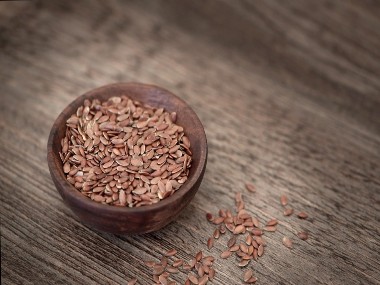They might be tiny, but edible seeds are powerhouses of nutrition. According to a study published in the journal Circulation in 2014, all seeds are rich in vitamins, minerals, phytonutrients and antioxidants, and can help keep cardiovascular diseases, diabetes and high blood pressure at bay. So clearly, munching on a handful of seeds is one of the best things you can do for your immune system and overall health. And it’s important to remember that all seeds have similar nutritional values. Yet, some seeds are gaining in popularity in India, despite the fact that they are not grown locally and are more expensive. Chia seeds are the best example, as this Central American seed is making its way through to Indian households and even restaurant menus. [caption id=“attachment_8093701” align=“alignleft” width=“380”]  Flax seeds. Image by Pezibear from Pixabay[/caption] But eating healthy also means eating local produce that your metabolism and genes are more used to gain benefits from. Here are some such seeds that Indians have been consuming for centuries, and you should indulge in too.
1. Flax seeds
Also known as tisi and alsi, these seeds are rich in fibre and omega-3 fatty acids apart from being chock-full of potassium, magnesium, iron and calcium. Flax seeds have a nutty flavour and you can have them whole or ground.
2. Sunflower seeds
A rich source of polyunsaturated and monounsaturated fats, sunflower seeds are also packed with vitamins B3, B5, B6, E and folate. That apart, sunflower seeds have substantial amounts of protein, iron, magnesium, copper, zinc, manganese and selenium.
3. Pumpkin seeds
Pumpkin seeds are extremely rich in healthy fats and protein. In addition, they are packed with vitamins B2 and K, phosphorus, manganese, magnesium, iron, zinc and copper too. These seeds also have antioxidants like carotenoids, which can help protect you from free radical damage and cancer.
4. Sesame seeds
These seeds are found in two colours in India - white and black - and both are packed with protein, fibre and vitamin B6. Sesame seeds are also exceptionally rich in calcium, phosphorus, magnesium and iron, which makes these seeds great for bone health.
5. Fennel seeds
Don’t just eat saunf as a mouth freshener, but also because it is rich in fibre, vitamin C, calcium, iron, manganese, magnesium and potassium. Fennel seeds are also rich in polyphenol antioxidants like rosmarinic acid, chlorogenic acid, quercetin and apigenin.
6. Carom seeds
Your mother might give you some ajwain to chew on when you have an upset stomach, but eating a spoonful of these seeds every day is going to give you more benefits. This is because apart from being rich in fibre, protein, calcium, thiamine, riboflavin, phosphorus, iron and niacin, carom seeds also have antifungal, antibacterial and anti-inflammatory properties.
7. Lotus seeds
Also known as fox nuts, those makhanas you love to eat are rich in protein, folate, niacin, pantothenic acid, pyridoxine, riboflavin, thiamin, vitamin A and minerals like manganese, phosphorus, copper, calcium, etc.
8. Poppy seeds
Popularly known as posto, poppy seeds are packed with healthy fats, vitamins C and E, potassium, iron, phosphorus, manganese, copper and calcium. You can toast them and top your meals with poppy seeds or grind them and add them to your curries to make them thick and creamy without adding any dairy.
9. Watermelon seeds
Instead of spitting them out while eating watermelon this summer, save the seeds, dry them and eat them too. Watermelon seeds are exceptionally rich in polyunsaturated and monounsaturated fatty acids, magnesium, iron and zinc.
10. Pomegranate seeds
Pomegranate seeds are sweet and rich in vitamins B6, C and K, potassium, phosphorus, folate and fibre. They are also packed with antioxidant compounds like tannins, flavonoids and anthocyanin. For more information, read our article on Nuts and Seeds: Nutrition, Health Benefits and Side Effects_._ Health articles in Firstpost are written by myUpchar.com, India’s first and biggest resource for verified medical information. At myUpchar, researchers and journalists work with doctors to bring you information on all things health.


)

)
)
)
)
)
)
)
)



